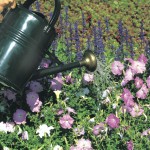Fertilize lawns, gardens responsibly to keep your water supply clean
March 30, 2016Spring has sprung, which means many of us are itching to get outside and start working on helping Mother Nature turn things green again. 
One springtime ritual, however, regularly leads to green, polluted waterways: over-fertilization of lawns and gardens. As the Penn State Extension office points out, “Lawn fertilizer contains the nutrients nitrogen and phosphorus, which are major sources of pollution in streams, rivers, and the Chesapeake Bay. When too much fertilizer is applied to lawns, the nutrients can run off into local storm drains. Excess nutrients can also seep into groundwater, which eventually makes its way into streams and rivers.”
Here are a few tips from the extension office to minimize water pollution when you get your greenery growing this year:
- Take a soil test to determine what nutrients your plants need. Plants and lawns may not require as much fertilizer as you think.
- Use natural fertilizers and time it right
- Use compost or slow release fertilizer on lawn areas; they release nutrients slowly.
- Leave grass clippings on your lawn to compost naturally.
- Avoid fertilizing your lawn before a heavy rain to prevent runoff of excess fertilizer.
- Sweep fertilizer off paved areas and rinse fertilizer spreaders on the lawn so that fertilizer can be absorbed by the grass rather than being lost to runoff.
A few other tips as you plan your landscaping projects: [ul style=”4″] [li]Build a rain garden to collect storm water [/li]
[li]Plant trees and shrubs along streams and riverbanks to avoid erosion.[/li][li]Install a rain barrel system and use the collected water for irrigation[/li][li]Avoid concrete and asphalt and use permeable options when possible to allow water to soak into, instead of running off of, the ground. This will also help reduce heat retention.[/li][li]Start a compost pile and use the end result to fertilize your lawn and garden.[/li][li]Finally, remember to water only when your garden needs it, and not to overwater.[/li]
[/ul]